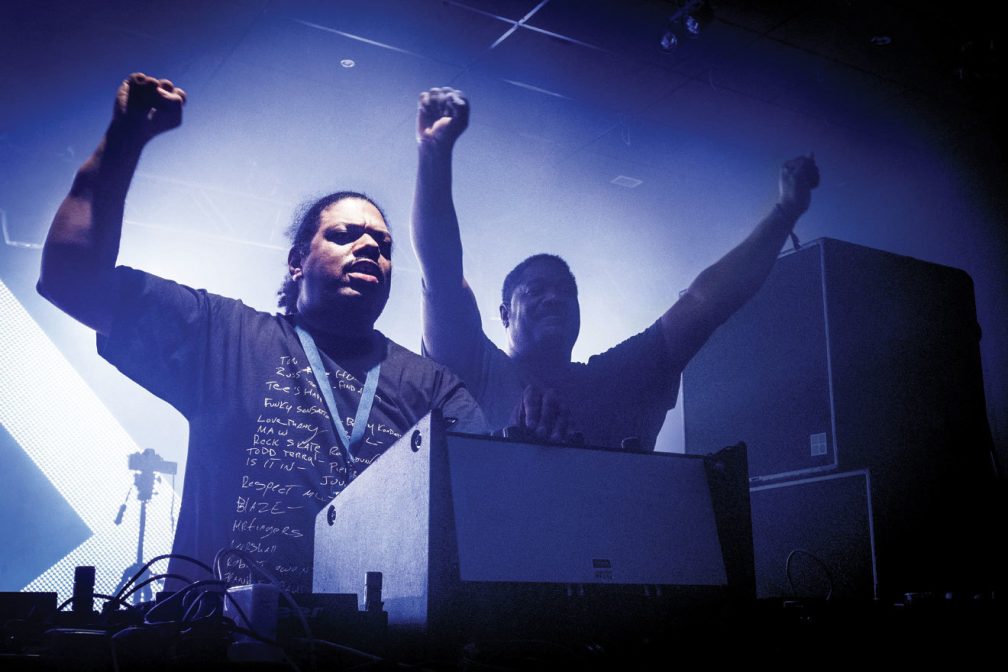 Features
Features
This is not the end: Kerri and Chez do Southport
We joined Kerri Chandler and Chez Damier for the final Southport Weekender
Southport Weekender was founded in 1987 by soul fan Alex Lowes, who envisaged a northern music weekend similar to the soul events then popular in the south, but with a more progressive music policy. The event has showcased hip hop and r'n'b, disco, Latin, African music, reggae, techno, jazz and leftfield dance with with Gangstarr, De La Soul, A Tribe Called Quest, Chaka Khan and Faith Evans among past guests. But it is with deep and vocal house that the event has become best known. "Back in '87, when Southport first started, I was playing clubs in New York," says Chandler, who's been DJing since he was 13. "I was recording my first records." "I was running my first club, the Music Institute in Detroit," says Chez.
The Music Institute only ran between '88 and '90, but its importance cannot be overstated. With Derrick May as main DJ, it became a focal point for Detroit's embryonic techno scene, bringing the studio-produced music of Kevin Saunderson, Juan Atkins and May to the streets of their peers and inspiring much of Detroit's second wave like Carl Craig and Underground Resistance. After it ended, Damier moved to New York to run the office of Saunderson's KMS label, where he first met Chandler. "We're the same age, but I felt like such a child under him," Damier says. "Kerri was the only one who looked like he knew what he was doing. I think the rest of us were just trying."
While visiting family back in Chicago, Damier was introduced to Ron Trent, a prodigious music talent who had produced the anthemic 'Altered States' aged just 17. They hit it off. Damier and Trent's first collaborative efforts, such as 'The Choice', were issued in the final days of KMS. "We did a deal with Kevin to take over his studio and we lived there," Damier tells me, "that's how we started Prescription."
Spirited, epic and sonically unique, Prescription Records and its sub-label Balance (which Damier still runs) not only defines what deep house truly is, it remains a blueprint for what the genre, now so often used as a catch-all term for anything that's not techno or EDM, can still be.
By comparison, Chandler's well-documented career saw him acting as a loner. He founded Madhouse, his first label, in the early 90s. He's since worked ceaselessly, producing an evolving catalogue that is without parallel that has helped define New York's distinct house sound."Because Kerri is a bona fide DJ he realises you've got to change with the times," says Damier. "We grew up with Michael Jackson, Prince and Madonna – people who had to keep reinventing themselves. Kerri's one of the few who have managed to reinvent himself in house music and do it successfully."
As relevant now as he was 20 years ago (catch him at DC10 again this summer), Chandler's profile, unlike many of his early peers, has never been higher.But the same cannot be said for the weekend's festivities. Throughout its tenure as the UK's premier black music event, Southport Weekender has showcased the vital contribution of black American house DJs and producers to the now global dance music sound. From pioneering guest DJ invites and live sets from the likes of Fingers Inc, through the 1990s' popularity peak of vocal house, the event's soul roots ensured that this truest version of house music was supported.
This dedication delighted its existing audience, but worked to the event's detriment. Southport Weekender and its music became old hat. Media outlets wouldn't cover it when there were bacchanalian German clubs or new European sub-genres to be freshly mined. New recruits arrived solely via word of mouth, and ultimately that wasn't enough. As its core audience aged, got mortgages and had kids, some started to drop out and weren't replaced. The event went from running twice yearly in its 1990s peak to facing a huge debt through lack of sales this year, resulting in the announcement that this is to be the last – the tragic irony being that this has happened at a time of unmatched hunger for real, authentic house music.


